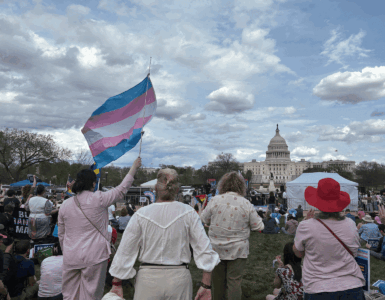Written by Kennedi Bryant
Election season buzzes through every corner of Howard University’s campus on Nov. 5.
Students who are first-time voters are filled with anticipation, to contribute to something bigger than themselves and make an impact.
While many students envision their vote as only choosing the next president, the local candidates and measures tucked below the heavy-hitting names of Kamala Harris and Donald Trump often have a deeper impact on daily life. From city council seats to community budgets, local elections influence everything from safety to education, yet it’s a vote that’s often overshadowed by the presidential election.
“Many people underestimate how important our local representatives are. For example, for me it was shown through the overturning of Roe v. Wade,” Kylaa Mcvea-Ocasio, an interdisciplinary environmental studies major from Dallas, Texas, acknowledged as she stopped for a moment from exploring the gated perimeter of the campus.
The Supreme Court’s overturning of Roe v. Wade highlighted how national-level appointments are often influenced by a strategic chain of local and state elections. Conservatives used this domino effect, electing like-minded officials at various levels who would later impact critical judicial appointments. This decision reminded many young voters that local elections can set the foundation for major national shifts.
“Our local candidates are the foundation for major systemic changes.” We must learn and take advantage of the electoral process’s domino effect,” says Mcvea-Ocasio.
While Howard students are generally passionate about politics, many recognize a gap in their understanding of local elections.
“I’m not informed on the local candidates,” admits George Evans, a junior legal communications major, as he joins the line outside Burr Gymnasium for the student election watch party. “I’m just now getting really into politics and understanding the importance of it.”
Social media has become a key tool for young voters to learn about politics, but its focus is often on the national stage, with less emphasis on local representatives. Without the convenience of curated local information on their screens, students like Evans sometimes find it challenging to stay informed.
“Social media right now is accessible for young voters, but we need to take it more seriously,” Evans reflects. “If it’s not entertaining, we scroll right past it.”
Yet as many seasoned voters have found, the importance of local officials often only becomes clear with time.
“When you’re younger, you don’t understand the importance of your local officials,” explains Howard alumna Mia Bruner, a DMV native who has seen firsthand the promise a committed local official can make. “As I got older and started paying more attention and paying taxes, it became more valuable as it impacted your everyday life.”
“I lived in the Mayor Marion Barry period and I was able to watch his impact on the community, particularly the black neighborhoods, it was because of him and his fight for the black community that just grew excellence and allowed us to strive for excellence,” recounts Bruner.
Mayor Marion Barry was a breath of fresh air for the D.C. area as he presented summer jobs and programs for youths and home-buying assistance for the working class, and put thousands of black individuals in middle- and upper-level city jobs that had once been reserved for white individuals.
“And this is during the crack era,” Ericka Blount, professional journalist, D.C native, and Howard University professor validates, “He was an activist all the way through. He was the reason I had a job at 14-years-old, he gave kids opportunities, ensuring that we stayed off the streets.”
For both Bruner and Blount, these formative experiences demonstrated the power of local leadership. “It makes a difference knowing your city is behind you, offering programs to help you succeed,” Bruner affirms. “If you don’t see it, you can’t achieve it. Pay attention to local officials, and you’ll see the impact they have on your life.”
As experienced voters call on the younger generation to discover who truly represents them, they emphasize the benefits of deeper community engagement.
“Become well-rounded; don’t pigeonhole yourself with national candidates,” encourages Kalema Meggs, a doctoral student in the Department of Communication, Culture, and Media Studies, as she passionately attempts to explain through the boisterous crowd at the watch party. “Educate yourself on who’s making these local decisions. Even if you’re not in college, you can get involved in your community. Every bit helps to make a difference.”
Howard University and its student organizations have taken meaningful steps to empower students with resources and knowledge. Through candidate forums, open discussions, and volunteer opportunities, these initiatives aim to deepen students’ understanding of how their votes shape not only national but, more crucially, community outcomes.
“I want Howard to educate their students, moving to not just be a voter but an educated voter,” urges Mcvea-ocasio.










Recent Comments